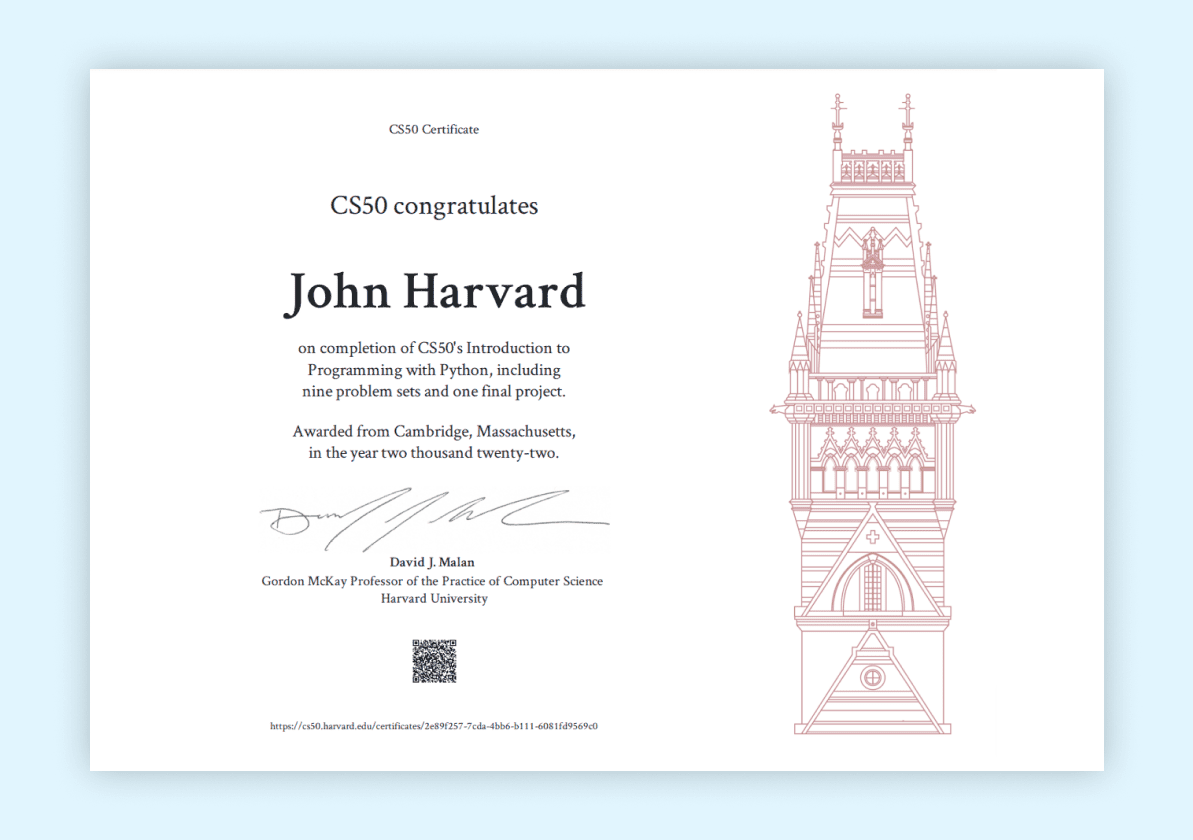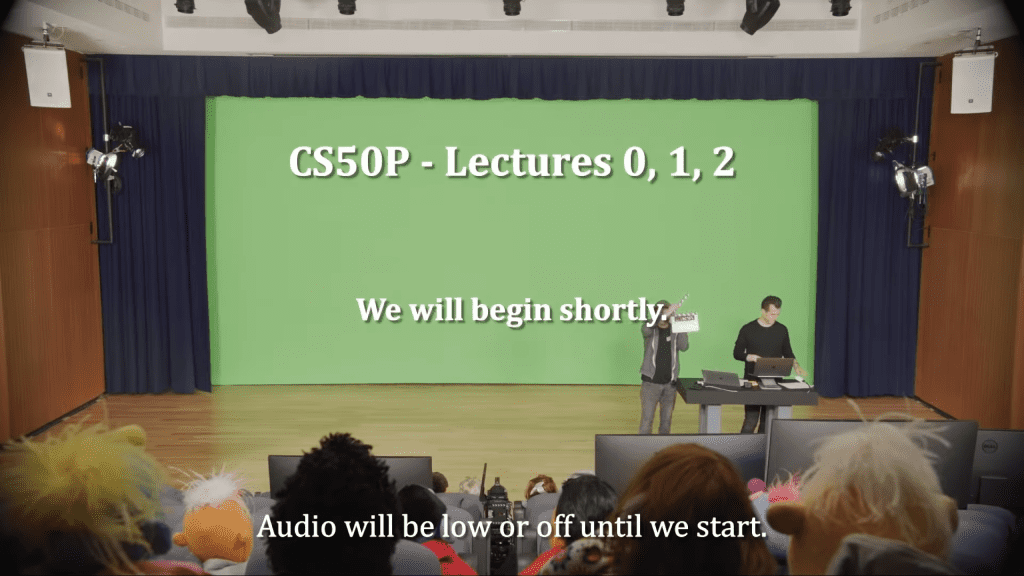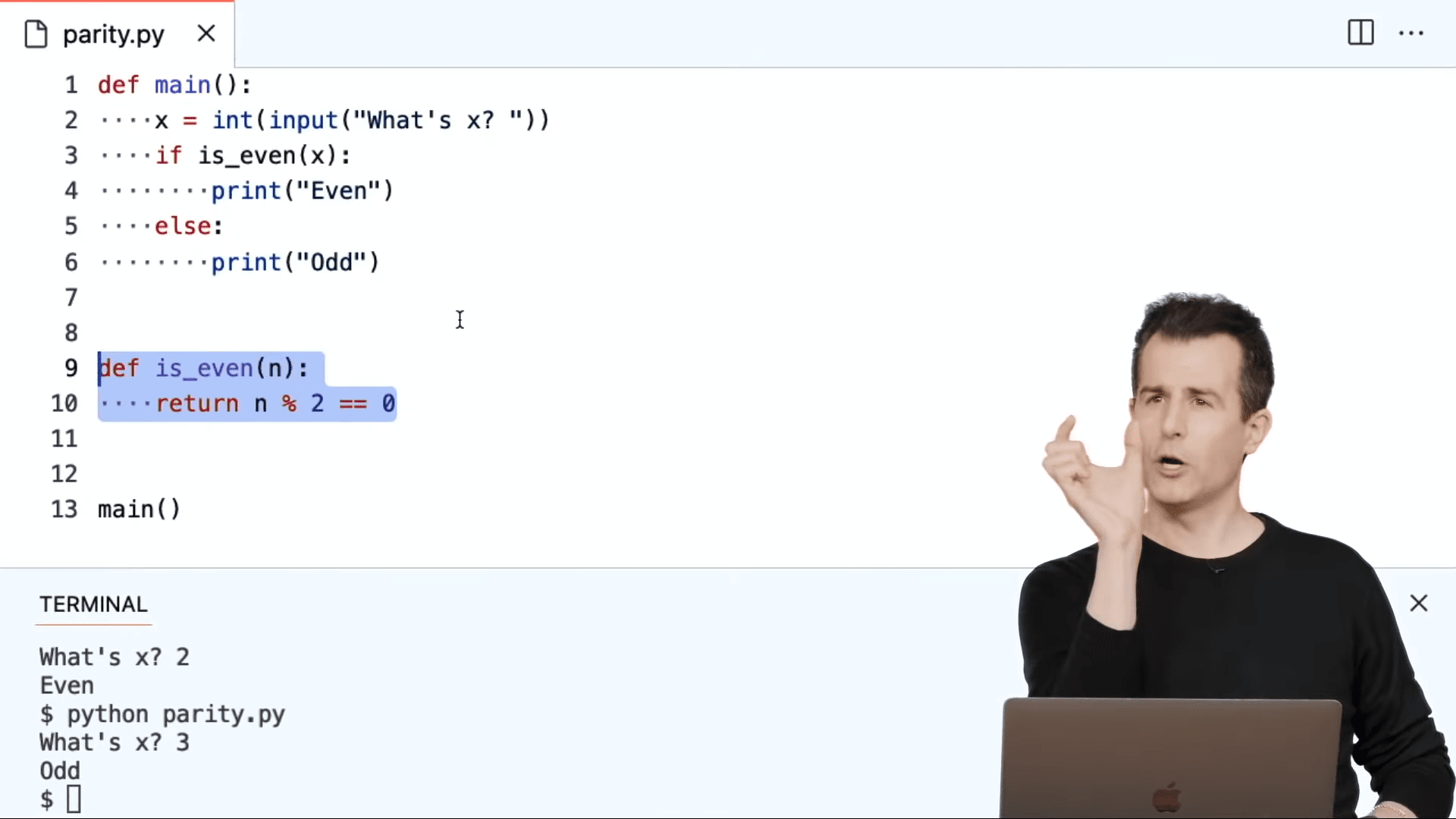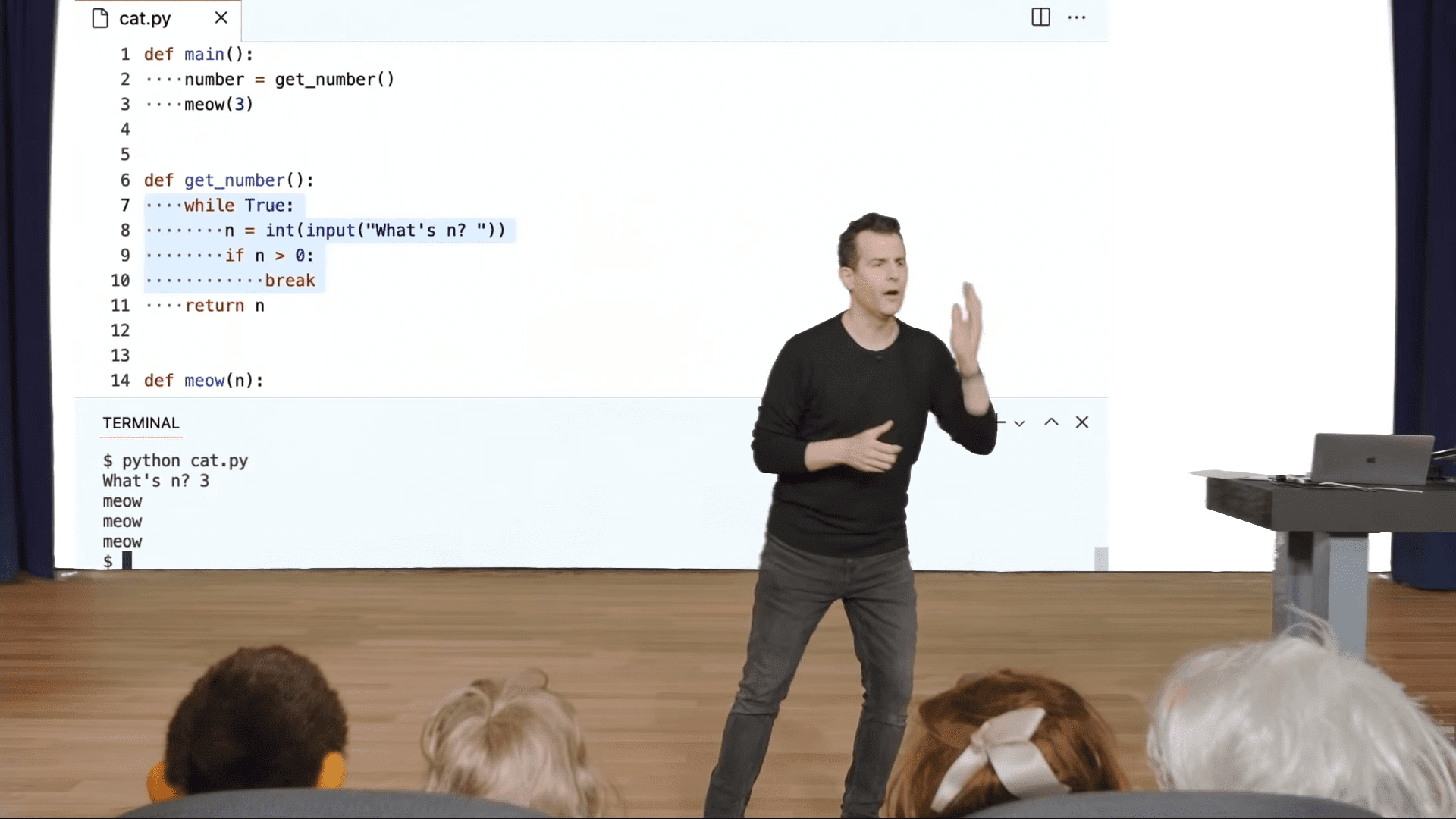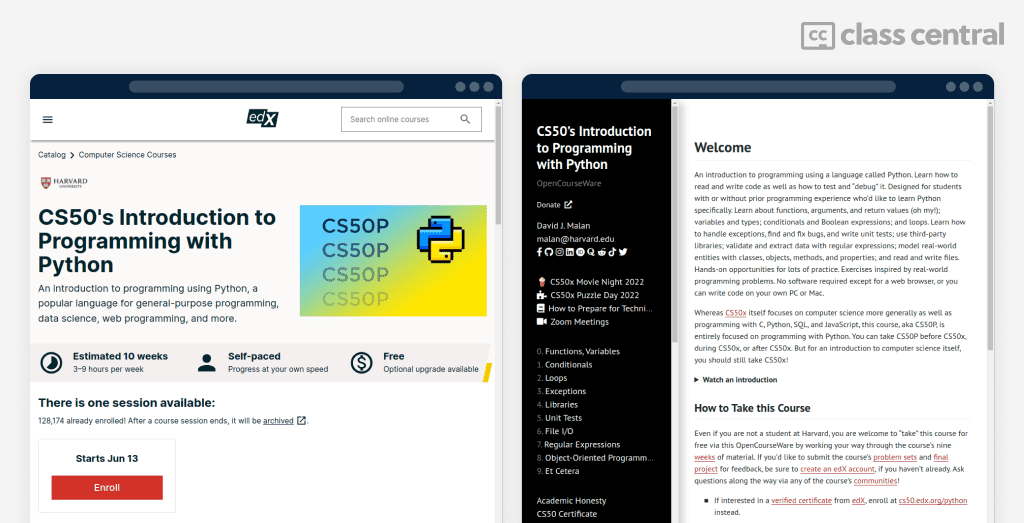

Harvard New Intro to Python: How to Earn a Free Certificate
source link: https://www.classcentral.com/report/harvard-cs50-python/
Go to the source link to view the article. You can view the picture content, updated content and better typesetting reading experience. If the link is broken, please click the button below to view the snapshot at that time.

Harvard New Intro to Python: How to Earn a Free Certificate
Let’s go over Harvard’s new introduction to Python and how you can earn a free certificate of completion.
Havard’s new Python course, CS50P: Free certificate of completion
A couple of months ago, Harvard launched a new free online course: CS50P, Harvard’s introduction to programming with Python.
It’s taught by Prof. David Malan, who also teaches CS50, Harvard’s introduction to computer science, one of Class Central’s Best Online Courses of All Time.
Harvard’s new Python course has many of the same strengths: a well-rounded curriculum, many coding assignments, and even a free certificate of completion.
Let’s go over Harvard’s introduction to Python and how you can earn a free certificate like the one above.
Approach
CS50P in the making: green screen, multiple cameras, clapperboard — just like a movie.
When I took CS50, I remember being impressed by how exciting it was. Most online courses simply involve an instructor talking into a camera or voicing over some slides. It can be an effective learning tool. But it sometimes makes for a dull affair.
CS50 was like a show. Prof. Malan would pace the stage in front of a live audience while filmed from multiple angles, explaining concepts at a sustained yet easy-to-follow pace, live coding his way through examples, and taking student questions.
This show-like precision led CS50, the most popular on-campus course at Harvard, to become one of the most popular online courses ever with over 3.6M learners. Fortunately, Harvard’s new Python course, CS50P, retains the same strengths.
In fact, the new course’s current recordings really let you appreciate its show-like side: interludes haven’t been edited out yet, so you can see Prof. Malan and his team doing sound tests, color checks, and even a few retakes. It’s like a movie set.
Curriculum
CS50P: Prof. Malan live coding, using the same in-browser editor that learners use in the course.
A nice thing about the new course is that it has no prerequisites: it’s a true introduction, made for complete beginners to programming and Python.
The course spans 9 weeks, with most weeks involving one 90-minute lecture and one problem set. And it hits the ground running. Within 20 seconds of the start of the first lecture, Prof. Malan will be introducing the most fundamental programming tool: the code editor.
In terms of content, the course is a rather comprehensive survey of Python programming. It starts with the basics, such as variables and conditionals, and works its way up the ladder of abstraction to discuss more involved subjects, such as object-oriented programming.
Among others, the course covers the following topics:
- Variables as well as data structures for storing them, such as lists.
- Conditionals, to allow your code to run different actions in different conditions.
- Functions, to package your programming logic and make it reusable.
- Loops, to run lines of code repeatedly; most notably, over each element of a list.
- Libraries, to extend Python functionality via ready-made software packages.
In the final lecture, the course also touches on concepts that give Python character, such as list comprehensions, generators, lambdas, and tuple unpacking, to name a few. By the end of the course, you’ll be able to confidently say that you know Python programming.
Assignments
CS50P: Taking student questions. (This interlude explains the green ears in the audience.)
But knowing a language conceptually is one thing. Being able to put it into practice is another. That’s why coding assignments are essential. And in my experience, that’s an aspect in which many programming online courses are lacking.
Coding assignments are often behind a paywall. Sometimes, they’re available but require setting up a local environment. This can be tricky, especially if instructions are outdated, which isn’t rare, because software keeps evolving but many courses are in “autopilot.”
The new course cuts through that by letting learners access all the assignments for free and conveniently complete them through an in-browser code editor. The assignments take the form of weekly problem sets designed to contextualize and reinforce the concepts learned throughout the week.
Problem sets typically involve five or so problems, allowing you to put into practice different facets of Python. Among others, the course includes the following problems:
- Unit testing: Writing tests to avoid introducing bugs into your programs.
- Data processing: Creating a program for reading and formatting a text dataset.
- Form validation: Using regex to validate forms, like websites often do.
- PDF generation: Generating PDF files programmatically with images and text.
- Class definition: Fleshing out a class modeling a cookie jar and its interactions.
This last problem is a playful way of practicing OOP, a popular programming paradigm that you’ll likely want to further explore. I think that’s one of the main strengths of Harvard’s new course: it will prepare you to tackle more advanced coursework, on Python and beyond.
Finally, in the last week of the course, you’ll tackle an open-ended Python project.
Free Certificate: How to Earn One
CS50P: On edX (left) — On Harvard OpenCourseWare (right)
Years ago, upon finishing a course, you’d often receive a free certificate of completion. But in their quest for profitability, online course platforms stopped offering free certificates, favoring paid alternatives. In my experience, free course certificates are extremely rare nowadays.
Fortunately, Harvard’s new Python course goes against the grain. Besides being entirely free in terms of learning content, it also offers a free certificate of completion. But figuring out how to earn the free certificate can be confusing, because the course is offered via two platforms:
- edX: This is the platform many of you will be familiar with. But edX hasn’t offered free certificates in a while. Instead, when you enroll in the course on edX, you’ll be given the option to purchase a verified certificate for $199.
- Harvard OpenCourseWare (OCW): This is the platform set up by Prof. Malan and his team, where you’ll get a free certificate once you complete the course.
Note that the course on Harvard OCW and edX are exactly the same, including all the assignments. The only notable difference is that on Harvard OCW, the certificate is free and doesn’t require ID-verification.
To unlock the free certificate, here’s what you need to do:
- Go to the CS50P page on Harvard OCW.
- Complete each week’s coursework — in particular:
- All problem sets with at least 70%.
- The final project with at least 70%.
- Unlock your free certificate.
Note that on Harvard OCW, you won’t need to enroll in the course per se. Lectures are readily available. Instead, you’ll set up a CS50 account via GitHub to submit your assignments, see your grades, and unlock your certificate. Don’t worry, it’s a one-time setup, and it’s all explained in the first assignment, Problem Set 0.
More Free Certificates
Finally, if you’re interested in some of the other courses in the CS50 lineup, or in free certificates in general, Class Central’s got you covered. Check our articles:
Recommend
-
 10
10
SubscribeSubscribe to Tharun ShivStay up to date! Get all the latest & greatest posts delivered straight to your inbox
-
 11
11
CODEXHarvard’s Most Popular Course is Free, OnlineHere’s why it’s worth it.
-
 13
13
polygon:从 play to earn 到 free to earn | 小辣椒区块链昨天说完链游将是 NFT 新动能后,今天就有机构朋友找上门来聊链游项目。毕竟,不能光看着 AXS“雇佣”东南亚劳动力捞金、吃肉,而自己在岸上干等着。这让笔者觉得链游已经感到“危险”地带...
-
 11
11
Guides Harvard CS50 Guide: How to Pick the Right Course for You (with Free Certificate) In 2022, CS50 includes 11 courses, 8 free certificate...
-
 15
15
ABOUT THIS COURSECourse overview$305.7 billionThe estimated worth of the global FinTech market by 2023.
-
 10
10
Cointiply Lets You Earn Free Bitcoin In Your Spare Time Cointiply Lets You Earn Free Bitcoin In Your Spare Time Cointiply makes it easy for anyone to earn free Bitcoin and start t...
-
 7
7
News Harvard CS50: Here’s How to Earn a Free Certificate Harvard’s introduction to computer science offers a free certi...
-
 8
8
1. Computer Science for Business Professionals What you'll learn Computational thinking Programming languages Internet technologies Web Development Technology stacks...
-
 3
3
Predict-and-Earn App Pooky Launching Free-to-Play Public Beta Ahead of FIFA World Cup Qatar November 16, 2022
-
 9
9
Harvard's New Computer Science Teacher Is a Chatbot The university is encouraging students to use 'CS50 bot' as their 24/7 learning assistant.
About Joyk
Aggregate valuable and interesting links.
Joyk means Joy of geeK
